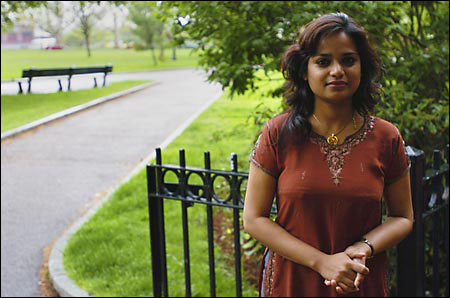Warrior for the poor
(Patnaik will resume her work with India’s least advantaged)

In the Indian state of Orissa, Dharitri Patnaik has loomed large, fighting for the rights of poor women and children.
Inspired by a youth spent playing with friends in a poor fishing village, Patnaik has made a career of fighting for those unable to fight for themselves. After a year as a Mason Fellow at the John F. Kennedy School of Government, Patnaik said she plans one day to take her fight into the halls of power as an elected official.
“I wanted a larger mandate, a bigger canvas to work on,” Patnaik said.
Patnaik said her year at the Kennedy School offered her a time to reflect, to work with people who “dream big dreams,” and to strategize about her future.
After graduation, Patnaik said, she will work with the relief agency CARE USA, directing activity on human rights, governance, and gender equity. After three or four years, Patnaik said, she plans to return to India to resume her battle for the poor there.
Patnaik said her father instilled in her a sense of duty toward the poor, a feeling of obligation that was, she said, reinforced by years of attending a Catholic school in Puri.
When in high school in the state capital of Bhubaneshwar, Patnaik and her cousins started an organization that reached out to the local poor – called “ragpickers.” They would listen to stories of harassment by police and shopkeepers and try to help the “ragpickers” with their problems. Patnaik taught the children to dance, and arranged for them to put on a show at a prominent theater.
Patnaik said she still gets goosebumps thinking about the moment when the proud parents of these children were sitting next to the government ministers who had accepted her invitation to the event.
“The parents were crying and telling me that they never thought their kids would dance in the most prestigious auditorium in town,” Patnaik said. “It was one of the first ‘aha’ moments in my life.”
Patnaik said she believes the group made a difference and that, as the ragpickers’ children became better known, violence against them dropped.
Patnaik earned a bachelor’s degree in sociology and psychology from Utkal University in Orissa and then a master’s degree in social work from the Tata Institute of Social Sciences in Bombay.
While in graduate school, Patnaik worked with inmates and people held pending trial because they couldn’t post bail. As she was graduating in 1996, she asked her mother if she could bring home a man who had been a drug addict and a violent habitual offender in an effort to rehabilitate him.
Together she and her mother, who had worked with women and children involved in India’s sex trade, counseled the man. Today, she said, he has set up his own house-painting business and employs several other people to work for him.
“That gave me a lot of hope that things can definitely change,” Patnaik said.
Patnaik went on to work with UNICEF and with ActionAid International on development, anti-poverty, and human rights issues. After the 1999 cyclone killed 10,000 people in Orissa, she designed and led “A Campaign of Love,” an organization that sought to reform emergency policies dealing with women and children, who became vulnerable to exploitation after the death of family members. The campaign’s emphasis was on building community capacity to deal with such people. The government used a similar model after the 2001 earthquake that struck Gujarat, Patnaik said.
In 2001, Patnaik moved to ActionAid’s London office, where she worked until early 2004, when she returned to India for several months before coming to Harvard.
“This is a time when I’ve reflected a lot,” Patnaik said. “This is a place where people dream big dreams and it gives me the confidence that I can make a difference.”




